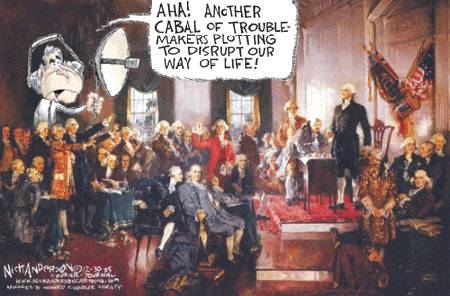Dick Cheney- Corporate Criminal |
|
 Details the myriad illegal, immoral, and unethical activities of Dick Cheney when CEO of Halliburton, his obstruction of justice, and lies to the American public since his appointment as Vice President.
For information on an equally corrupt politician, see link to Tom DeLay-Corporate Whore.
Be sure to visit our cavernous vault of archives.
Details the myriad illegal, immoral, and unethical activities of Dick Cheney when CEO of Halliburton, his obstruction of justice, and lies to the American public since his appointment as Vice President.
For information on an equally corrupt politician, see link to Tom DeLay-Corporate Whore.
Be sure to visit our cavernous vault of archives.Cost of the War in Iraq
(JavaScript Error)
|
 Cheney strongly backs eavesdropping operation Jan 4, 3:21 PM (ET) By Patricia Wilson WASHINGTON (Reuters) - Vice President Dick Cheney on Wednesday strongly defended a secret domestic eavesdropping operation and said that had it been in place before the September 11 attacks the Pentagon might have been spared. Cheney insisted that the highly classified program, authorized by President George W. Bush after hijackers flew planes into the World Trade Center's twin towers in New York and the Pentagon in Washington, had helped prevent potential terrorist attacks and did not violate civil liberties. He said as the memory of September 11 faded, some politicians were "yielding to the temptation to downplay the ongoing threat to our country and to back away from the business at hand." "The enemy that struck on 9/11 is weakened and fractured yet it is still lethal and planning to hit us again. Either we are serious about fighting this war or we are not," Cheney told the Heritage Foundation think tank. Revelations that the National Security Agency was secretly monitoring phone calls between people in the United States and al Qaeda suspects abroad has sparked an outcry from Democrats and Republicans. Many questioned whether it violates the U.S. Constitution. A 1978 law, the Foreign Intelligence Surveillance Act, forbids domestic spying on U.S. citizens without the approval of a special court. Bush secretly authorized the NSA to intercept communications without court approval. The agency may have begun to broaden its eavesdropping even before Bush's authorization, according to a declassified letter released by Rep. Nancy Pelosi of California, leader of the minority Democrats in the House of Representatives. "There are no communications more important to the safety of the United States than those related to al Qaeda that have one end in the United States," Cheney said. "If we'd been able to do this before 9/11, we might have been able to pick up on two of the hijackers who flew a jet into the Pentagon." "They were in the United States, communicating with al Qaeda associates overseas, but we didn't know they were here plotting until it was too late," he said. Democratic Sen. Russ Feingold of Wisconsin dismissed Cheney's argument as "the kind people like to make sometimes when they're trying to cover their tracks." He said that before September 11, the government could, with court approval, have tried to intercept such conversations. CIVIL LIBERTIES Cheney said Bush was committed to protecting civil liberties and had made clear that "our duty to uphold the law of the land admits no exceptions in wartime." Pointing out that four years and four months had passed without another attack in the United States, Cheney acknowledged a "natural impulse" to let down one's guard. However, he said, "America has been protected not by luck, but by sensible policy decisions, by decisive action at home and abroad, and by round-the-clock efforts on the part of people in law enforcement, intelligence, the military and homeland security." Pelosi's letter, written four years ago, said that Air Force Gen. Michael Hayden, who was then NSA director, informed the House intelligence committee of a change in the scope of the agency's activities at an October 1, 2001, briefing. "I am concerned whether, and to what extent, the National Security Agency has received specific presidential authorization for the operations you are conducting," said Pelosi, then the intelligence committee's ranking Democrat. Pelosi's office also released a heavily edited October 18, 2001, reply from Hayden which said: "In my briefing, I was attempting to emphasize that I used my authorities to adjust NSA's collection and reporting."
Comments:
|